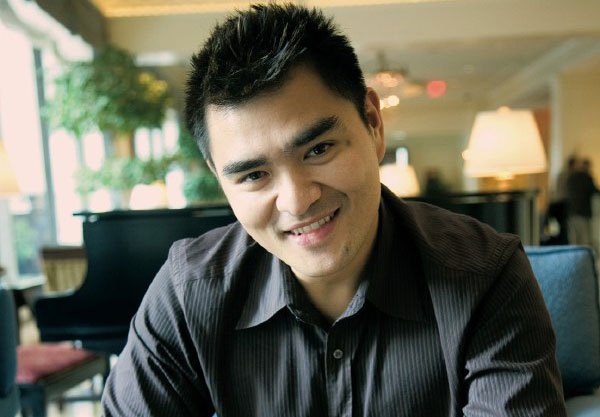• See "Documented" film trailer
Every day, an estimated 1,100 undocumented immigrants are deported – which means that in five years, the United States government deports nearly 2 million immigrants.
There are an estimated 11 million undocumented people in America today..
Jose Antonio Vargas, an award-winning journalist, filmmaker and the founder of Define American, a nonpartisan campaign for immigration reform, wants to make a real change for the better in the lives of undocumented immigrants.
To expand his personal and organizational mission, Vargas, a native Filipino, wrote and directed “Documented,” the first project from his company, Apo Anak Productions, named in honor of his grandparents and mother. (In Tagalog, his native language, “apo” means grandchild and “anak” means “child.”)
The film chronicles Vargas’ journey to America from the Philippines as a child and his journey through America as an immigration reform activist. It premiered last June at the American Film Institute Docs Film Festival in Washington, D.C., and will air this summer on CNN.
On April 12, the University of Virginia’s Virginia Film Festival will screen “Documented” twice – at 1 p.m. at Newcomb Hall Theater on Grounds and at 5:30 p.m. at Regal Stonefield Stadium 14 – with Vargas attending both screenings and fielding questions afterward.
The screenings, free and open to the public, are sponsored by The Shops at Stonefield, Parallel 38, the Office of the Provost and the Vice Provost for the Arts. The 1 p.m. screening at Newcomb Hall Theater is first come, first served. The Regal Stonefield screening at 5:30 p.m. is ticketed, and the pertinent ticketing information can be found here.
“Documented” is part of the Virginia Film Festival’s participation in the 2014 Tom Tom Founder’s Festival, which will be held April 9-13.
“With ‘Documented,’ the Virginia Film Festival continues its tradition of screening landmark documentaries that address important cultural, political and social issues that are at the forefront of discussion in America today,” said Jody Kielbasa, vice provost for the arts and director of the Virginia Film Festival.
Vargas describes himself as the best-known undocumented immigrant in the United States, having appeared in television interviews from Comedy Central’s “The Colbert Report” to Fox News’ “The O’Reilly Factor.”
Vargas has been a journalist for more than a decade, writing for some of the most prestigious news organizations in the country, including Rolling Stone, the Huffington Post and the Washington Post, where he was part of the team that won a Pulitzer Prize for coverage of the 2007 massacre at Virginia Tech.
In June 2011, Vargas told the biggest journalistic story of his career: himself. In a landmark essay for the New York Times Magazine, titled “My Life as an Undocumented Immigrant,” he revealed his undocumented status.
Since then, armed with a camera, Vargas has traveled the country engaging people in dialogue about one of the most controversial, yet least understood issue in America: immigration in a demographically changing America.
In June 2012, Vargas popularized the term “undocumented Americans” in describing the country’s population of 11 million undocumented immigrants in a cover story for Time magazine, titled “We Are Americans* (*Just Not Legally),” where he appeared on the cover of the magazine with fellow undocumented immigrants.
In February 2013, Vargas moderated a White House online chat on President Obama’s proposal for immigration reform and testified in front of the Senate Judiciary Committee.
“I am an American,” Vargas said. “I just don’t have the right papers.”
Vargas was born in Antipolo in the Philippines in 1981. In 1993, when Vargas was 12, his mother sent him to live with his grandparents in the United States, but without obtaining authorization for him to stay in the country permanently.
Vargas did not learn of his immigration status until 1997, when at age 16 he attempted to obtain a California driver’s license with identity documents provided by his family that he then discovered were fraudulent.
He kept his immigration status secret, pursuing his education and fitting in as an American with the help of friends and teachers, using false documents including a green card, Filipino passport and a driver’s license to help him avoid deportation.
In 1999, Vargas came out as gay while in high school, a decision he describes as being “less daunting than coming out about my legal status.”
He has spoken out against the Defense of Marriage Act, labeling it an immigration issue that disadvantages him from “marry[ing] my way into citizenship like straight people can.”
“I became a journalist, and later a filmmaker, to get to know my adoptive country and my volatile place in it as a gay, undocumented Filipino American,” Vargas has written.
“As a newcomer to America who learned to ‘speak American’ by watching movies, I firmly believe that to change the politics of immigration and citizenship, we must change culture. That’s why I felt compelled to take charge of my own narrative and write, produce and direct ‘Documented.’”
According to Vargas, “Documented” is not the exact film he set out to make, but the one he needed to make. A broken immigration system, he has said, means broken families and broken lives.
“I did not realize how broken I was until I saw how broken my mama was,” Vargas has written. “In the process of documenting myself, I ended up documenting Mama – and the sacrifices of parents who make America what it is, then and now.
“At the very least, I want viewers of the documentary to ask the question I posed as I filmed and traveled our country from California to Alabama: ‘How do you define American?’”
Media Contact
Article Information
March 24, 2014
/content/virginia-film-festival-screen-landmark-documentary-immigration-reform

